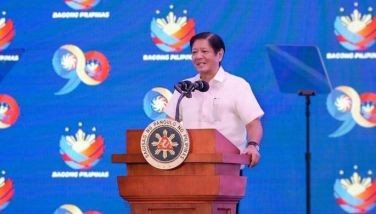Duterte's 'cross the Rubicon' remark does not equate to cutting US ties, says Yasay
MANILA, Philippines — Foreign Affairs Secretary Perfecto Yasay said Tuesday that President Rodrigo Duterte's "cross the Rubicon" statement does not mean that the Philippines is veering away from its traditional friendship with the United States.
Yasay's defense of the president's critical comments against the longtime Philippine ally was not the first one.
The Philippine foreign minister, who just came back from his US visit, said during a press briefing Tuesday that he also calmed fears in Washington DC of souring Philippine-US relations in favor of China. He said such claims are unfounded.
Duterte, in his latest remarks on Monday, said he told Russian Prime Minister Dmitry Medvedev that he is "about to cross the Rubicon" — an idiom meaning to pass a point of no return — with the US on the sidelines of the Association of South East Asian Nations Summit earlier this month. He said no one knew about their one-on-one talk where he also asked for Russia's help in terms of trade and commerce in the six years of his term.
The US is the second biggest export market of the Philippines next to Japan.
He added that he also told Chinese President Xi Jinping that he would open up all avenues of trade and commerce for China.
"They can come in. Wala pang panahon because I could not amend the Constitution right now. Then I can give them 60 years plus another 60 years. By that time you won't need your factory here already."
Yasay told the media that the president might have made the comments in such a "manner to dramatize what he feels are the areas that would need further strengthening" in terms of the country's relationship with the US.
He added that the president wants to undertake an independent foreign policy without neglecting that the Philippines is part of the international community.
Yasay noted that the Philippines' relationship with China has "cooled off" during the previous administration, which filed an international arbitration case against Beijing over South China Sea disputes.
The Philippine foreign minister noted that the dispute should not prevent Manila's stronger ties with Beijing as they could pursue other aspects of relationship like trade, people-to-people connectivity, cultural ties and infrastructure development.
"Ang sinasabi ng presidente, sa pagkakaintindi ko, is that kung may ino-offer ang mga ibang bansa gaya ng China o Russia in so far as let's say engaging our country with trade relationship and arrangement and assistance that they're willing to offer, we should not be arrogant to reject it," Yasay said.
"This is actually in pursuance of our national interest."
The specifics of what the president wants to pursue with the two countries, however, are not yet known, Yasay added.
Crafting an independent foreign policy
In pursuing an "independent" foreign policy, Yasay said national interest must be prioritized. Next to consider is the convergence of mutual interests of the countries.
Foreign policy analyst Dindo Manhit said three principles must be considered in crafting an independent foreign policy.
RELATED: How should the Philippines engage the world?
First, the approach must favor the country's fundamental interests. Second, it must adhere to national and international law. Lastly, it must be accomplished in the least costly manner.
Manhit noted that the country could still enjoy its independence "without squandering its hard-earned, advantageous relationships with other countries."
Yasay, however, repeated that the Philippines is not burning bridges with the US. — Video report by Efigenio Toledo IV
- Latest
- Trending




























